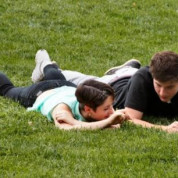
When I am facilitating or coaching people about communication, I often ask them to listen to the other person as a clear witness, an open space in which the other person is simply received as they are, seen as they are. This is the easiest thing in the world to talk about, and not at all easy to embody. Because in order to be that clear witness, I have to temporarily lay down all of my fixed points of view, and enter into the other person’s world. I can’t really understand you unless I do this. This is a whole other way of understanding what it is to be ‘fair.’ My world is so different from yours, that unless I am willing to step into your world, I will only see a little bit of who you are. I’ll see you through my own biases, my own limitations. That’s not really fair, because it doesn’t include that much of who you are.
You don’t have to know how to step into another person’s perspective—you just have to be willing to do so. That willingness creates a powerful space of presence, of deep listening. This kind of listening feels more and more like love to me. I’ve seen people touched to their core, when someone was able to listen to them from this place. Healing happens spontaneously in this space of listening. We don’t even have to talk. Silent conversations happen like this sometimes, when intimacy flowers in the shared space without words.
After the brutal reign of apartheid in South Africa was over, Desmond Tutu, Nelson Mandela and others created an amazing process called ‘Truth and Reconciliation.’ They facilitated many meetings between the perpetrators of horrific crimes and their victims, during which they all had the opportunity to let go of the past.
On many days, Desmond Tutu would go right into the villages where these people were, and sit down on a log to talk with them. He would be accompanied by neutral observers called ‘fair witnesses.’ People would show up covered with machete scars, or with limbs missing. They would face their perpetrator and say, “You did this to me,” or “You killed my mother, right in front of me.”
There was a promise, made to the perpetrators, of no retaliation, no matter what was revealed. No consequence. Because of this promise, the perpetrators were able to say, “Yes, I did that. I hear what you are saying, and I hear the incredible pain and suffering caused by me… But now, listen to my story.”
And everyone there would listen to their story. Not to the story about what happened, but the inner story, about what brought this person to the point where he did what he did. This was the truth that needed to be heard before real reconciliation could happen.
Often it was a story of a young child being kidnapped from his village and being thrown without warning into a world of violence and terror. For this terrified child, “Why didn’t you save me?” was the question burned into his heart. He didn’t understand that his parents were helpless.
I’ve often wondered what it took for Bishop Tutu, Nelson Mandela and all the others to sit and listen to such terrible stories, stories full of such violence and degradation. Somehow, from the very beginning of the process, a profound intelligence in these men inspired them to stand present in this way. They had the courage and depth of intention to show up as a fair witness. They carried in their hearts the sense of a radically new possibility. And it happened.
When the stories were allowed to unfold like this, with no consequence, something amazing occurred, over and over again. Ordinary people were able to experience being a fair witness. They found they could actually step into each other’s shoes. They were able to stop looking at each other from the place where the other person was a foreign object. They allowed themselves to slip right inside their world.
There is a shot, at the end of one of the Truth & Reconciliation videos, of a woman who had been one of the victims calling most loudly for revenge. After going through the whole process, she is walking down the road in her village, with a bucket on her head. She meets her perpetrator on the road, and passes him in silence.
After they pass, she is approached and asked, “What do you feel now, when you pass this man on the road?”
“Well,” she says, “I’ve said a lot. I have a life to live now. I have things to do; I can’t be bothered with this anymore.”
Healing often happens like this. We just don’t want to carry the past around with us anymore. We simply decide to lay it down, in a real way. The Dalai Lama describes this kind of forgiveness as living with a mind like water, to which nothing sticks. It’s incredible to think that we can all learn to live with this mind like water. All it requires is a willingness to step into the other person’s shoes, to look at life with their eyes, to feel the world the way they feel it.
Is there anyone in your life with whom you are holding separation and judgement?
Can you imagine what would happen to your heart, if you let yourself stand, even for a few moments, in their shoes?
The Listening Prayer
May we all be free from suffering and the root of suffering.
May our practice of listening release the illusion of separation.
May it heal the listener, heal the one who is heard, and bring
healing forth in an ever-expanding circle that knows no boundaries.
with love
Shayla


Stay Connected